Ministry of Science & Technology
Science 20 Conference on Clean Energy for Greener Future held in Agartala, Tripura on 3-4 April 2023
Posted On:
06 APR 2023 8:41PM by PIB Imphal
G20 – Science20 conference on ‘Clean Energy for Greener Future’ was held in Agartala, Tripura on 3-4 April 2023. The meeting brought together experts in Clean Energy Technologies and Energy Policy together to discuss the collaborative future forward for a clean world for all. Under the overarching theme of Disruptive Science for Innovative and Sustainable Development, the meeting in Agartala focused on technological aspects of hydrogen energy, energy from oceans, and new generation energy storage.Other than science and technology of clean energy; policy, action roadmaps and cooperation were also deliberated intensely. The meeting was Chaired by Prof Ashutosh Sharma, President, Indian National Science Academy and Co-Chair, Science 20.
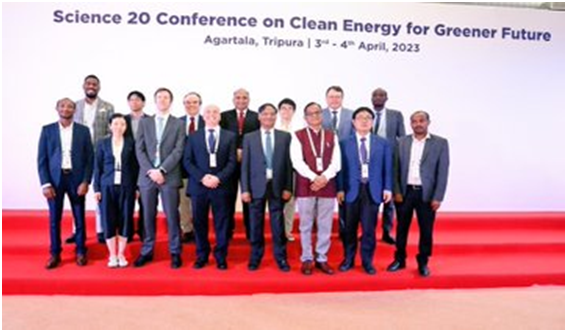
Science20 Engagement Group, comprising the national science academies of the G20 countries, was initiated during Germany’s Presidency in 2017. It presents policymakers with consensus-based science-driven recommendations formulated through task forces comprising international experts.
India, as the President of G20, aspires to make G20 truly “inclusive, ambitious, decisive, and action-oriented”, as exhorted by Prime Minister Narendra Modi. The agenda of Science20 reflects this principle in the planning and use of science for inclusive and sustainable development.
Views from 10 member states were presented at the meeting of which Argentina, Australia, Brazil, China, Russia, United Kindgom, and United States of America were present in the meeting. Views from France, Germany, and Indonesia were expressed in a written statement that was communicated by the Chair. WHO also participated in the meeting and expressed their views on health and energy nexus.
It was observed that clean energy is a disruptive science that will lead the way in transitioning to a more sustainable future. The just transition to clean energy sourcescan provide us with an opportunity to create new jobs. This shift could be achieved through increased investment in clean energy technology research and development, improved access to capital for businesses investing in clean energy production, and better education regarding the benefits of transitioning away from traditional forms of energy generation.
Such a just transition must ensure that those who currently rely on traditional forms of power generation are not left behind or disproportionately impacted by these changes. We must strive for equitable solutions that enable everyone to benefit from the advances in clean energy technologies while mitigating any negative consequences associated with this shift in our energy infrastructure.
The meeting was opened with welcome remarks by Prof. Narinder Mehra, Vice President (International), Indian National Science Academy, who emphasizedthat “on this journey towards sustainable development, it requires us all coming together united by common goals enabled by transformative technological advances driven by radical ideas grounded in powerful yet compassionate thought leadership through innovative practices based on disrupting traditional approaches through collaborative efforts built upon strong foundations laid down by courageous people who dare dream bigger than ever before.”
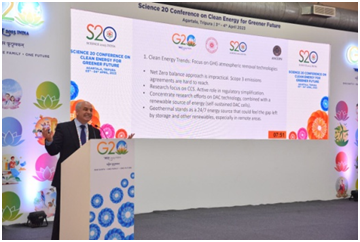
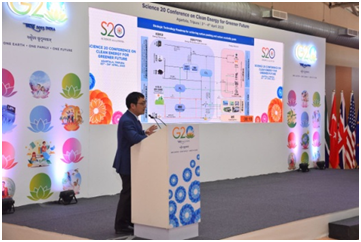
ProfAjaySood, Principal Scientific Adviser to the Government of India, said introduced the meeting and observed that, “this is an especially important moment for us as we are faced with unprecedented environmental issues that require immediate action if we want to make meaningful progress towards achieving a more sustainable future for generations to come.”
In his opening remarks, Prof. Ashutosh Sharma, President, Indian National Science Academy and the Chair of the meeting said that, “What’s clear is that if we are going to make any meaningful progress towards achieving our goal of global sustainability then embracing disruption-based approaches within all areas related to renewable energies must be considered as part and parcel going forward. As such, initiatives aimed at encouraging collaboration between different sectors should be further explored as well as efforts geared towards fostering productive conversations between scientists, policy makers, entrepreneurs, investors etc., all working together towards finding creative solutions that will help us build a better future powered by cleaner sources.”
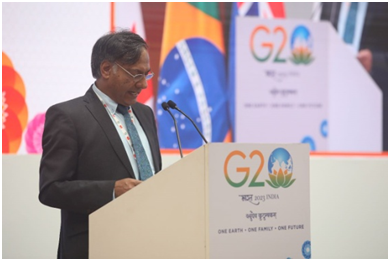
In the sessions dedicated to science & technology and policy, experts discussed the promise and challenges of different energy storage technologies, the potential of energy from the ocean, and the roadmap for the adoption of hydrogen as a significant source of renewable energy. The afternoon session explored the transition to clean energy from the perspectives of industry, academia, and policy scholars.
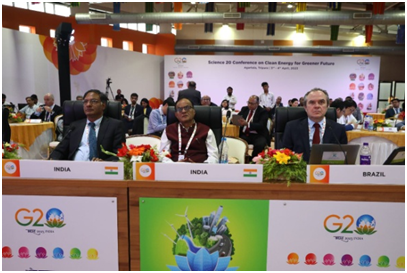
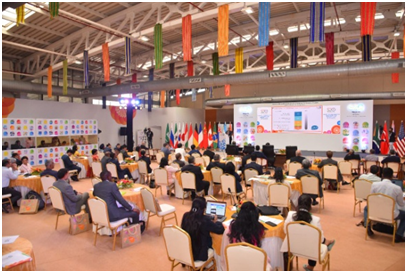
The theme overview talk was delivered by Dr Vijay Kumar Saraswat, Member, NITI Aayog who presented a holistic view of the science and policy infrastructure of clean energy. The speakers at the meeting were Prof Vijay Mohanan Pillai who spoke on new-generation energy storage, Prof Madhavan Nair Rajeevan delivered a talk on energy from oceans, and the discussion on hydrogen energy was led by Prof Ashish Lele. The views from industry were presented by Dr Ramkrishna R Sonde and Dr S S V Ramkumar. Dr R Tharamani presented the comprehensive overview of the technologies and science available today that can be harnessed.
Ian Wiggins delivered a talk on “Global Cooperation for Disruptive Science and Technology”, Dr Tomas Zapata talked about “Clean Energy Proposals from Academic and Industry in Perspective”, “Clean Energy for a Greener Future The Brazilian Perspective” was delivered by Dr Julio Romano Meneghini, while Prof Li Xianfeng gave a comprehensive view of the Chinese initiatives towards Clean Energy.
Expert Committee observations were made by Prof Uday Desai who emphasized on need for embracing AI and ML for energy transition initiatives and Prof Ambuj Sagar taking into account the discussions held during the meeting said that energy access needs to be greatly accelerated in mission mode which would leverage the revolution in modern and clean energy technologies that are driven by climate mitigation needs and recent scientific advances.
The meeting concluded with remarks from the Chair, Prof. Ashutosh Sharma, who stressed the importance of disruptive science for clean energy transition and added that these solutions must be equitable and achieved through collaboration.
The S20 meetings are presided over by India in 2023, and the upcoming meetings will be held in Lakshadweep and Bhopal, focusing on Universal Holistic Health and Connecting Science to Society and Culturerespectively. The Summit Meeting will be held in Coimbatore in July.
*****
SK
(Release ID: 1914440)
Visitor Counter : 6409